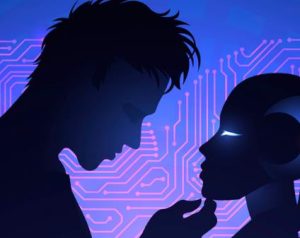Can AI Replace Human Companionship?
The Quest for Artificial Intimacy As technology continues to evolve, the question of whether AI can replace human companionship becomes increasingly relevant. With AI systems becoming more sophisticated, they begin to enter spaces traditionally occupied by human connections, including those of emotional and social support.

Understanding the Human-AI Interaction AI companions, often referred to as AI girlfriends, are designed to simulate conversation, provide emotional support, and respond to user inputs in a seemingly intelligent manner. These interactions are powered by complex algorithms and machine learning techniques, allowing the AI to learn and adapt to its user's preferences and emotional states over time.
Emotional Complexity and Authenticity While AI can offer a form of companionship, it fundamentally lacks the genuine emotional complexity and spontaneity of human relationships. Human connections are built on shared experiences, empathetic understanding, and deep, often unspoken emotional exchanges. In contrast, AI companions, no matter how advanced, operate based on predefined parameters and learned data, which can simulate but not replicate human emotions.
The Role of AI in Addressing Loneliness Despite these limitations, AI companions have proven effective in certain scenarios, particularly in providing company to those who feel isolated. For instance, a recent survey indicated that 60% of participants who interacted with an AI companion felt less lonely on a daily basis. This suggests that while AI cannot fully replace human interaction, it can serve as a supplementary form of support, especially for those who lack social connections.
User Experience and Satisfaction Users of AI girlfriend applications often report satisfaction with their interactions, citing the convenience and non-judgmental nature of AI companions. These digital entities are available 24/7, do not get tired or emotionally drained, and can provide consistent, albeit programmed, responses to the user’s emotional disclosures.
Privacy and Ethical Concerns One of the significant hurdles in the widespread acceptance of AI as a substitute for human companionship is the privacy and ethical implications of such relationships. AI companions require access to extensive personal information to function effectively, raising concerns about data security and the potential misuse of sensitive information.
AI Girlfriend: A Supplement, Not a Substitute While AI girlfriends can offer conversation and emotional support, they do not possess the ability to understand or feel emotions in the human sense. Their responses, though sometimes seemingly appropriate and comforting, are ultimately based on algorithms and data analysis rather than genuine emotional intelligence.
Evolving Perspectives on AI Companionship As AI technology progresses, the capabilities of AI companions will continue to advance, making them even more realistic and interactive. However, the question of whether AI can truly replace human companionship remains complex. AI can supplement human interaction, particularly for those experiencing social isolation, but it is unlikely to replace the depth and authenticity of human relationships.
Conclusion AI has the potential to serve as a meaningful supplement to human interaction, particularly for those who lack regular social contact. However, it cannot fully replace the nuanced and emotionally rich connections that define human relationships. As we navigate the future of AI in social contexts, it is crucial to balance technological advancements with a nuanced understanding of human emotional needs.